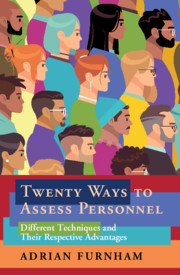Book contents
- Twenty Ways to Assess Personnel
- Twenty Ways to Assess Personnel
- Copyright page
- Dedication
- Contents
- Tables
- Preface
- Acknowledgements
- 1 Introduction to Selection and Assessment
- 2 Complex and Sticky Issues in Assessment and Selection
- 3 Traditional and Mainly Discredited Assessment Methods
- 4 Self-Report Tests
- 5 Observer Reports
- 6 Behavioural Tests
- 7 Physiology
- 8 Biography
- 9 Big Data
- 10 The Future of Assessment
- Index
- References
10 - The Future of Assessment
Published online by Cambridge University Press: 11 June 2021
- Twenty Ways to Assess Personnel
- Twenty Ways to Assess Personnel
- Copyright page
- Dedication
- Contents
- Tables
- Preface
- Acknowledgements
- 1 Introduction to Selection and Assessment
- 2 Complex and Sticky Issues in Assessment and Selection
- 3 Traditional and Mainly Discredited Assessment Methods
- 4 Self-Report Tests
- 5 Observer Reports
- 6 Behavioural Tests
- 7 Physiology
- 8 Biography
- 9 Big Data
- 10 The Future of Assessment
- Index
- References
Summary
This chapter looks at the future of people assessment. Like many other areas of business there have been many, and rapid, technology-led changes. There are questions about who are or should be assessed; when and how they are assessed; the cost and legal changes in assessment; and how data is stored. The quiet world of academic-led assessment and testing has been ‘invaded’ by people in business eager to sell psychological testing and assessment to a much larger market. Inevitably there are enthusiasts and sceptics: the former claiming how AI computer and neuro-science technology will revolutionise the ease, cost and accuracy of assessment, while the sceptics argue there is still very little evidence for these claims. It certainly is a ‘good time to be alive’ for those interested in people assessment.
Keywords
- Type
- Chapter
- Information
- Twenty Ways to Assess PersonnelDifferent Techniques and their Respective Advantages, pp. 506 - 525Publisher: Cambridge University PressPrint publication year: 2021



